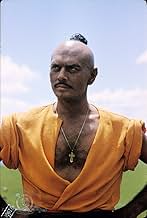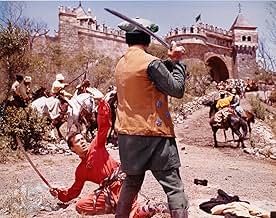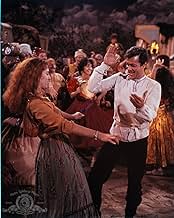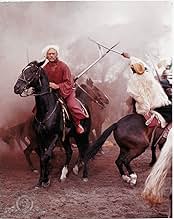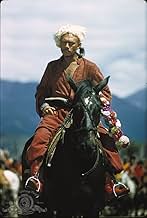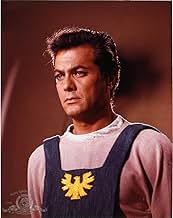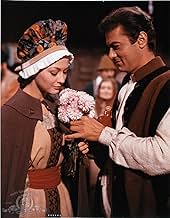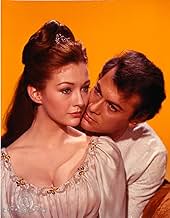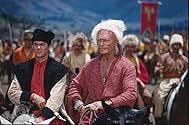IMDb-BEWERTUNG
6,3/10
4783
IHRE BEWERTUNG
Im 16. Jahrhundert kämpfen die polnischen Oberherren und die ukrainischen Kosaken für die Kontrolle des Landes, aber häufige türkische Invasionen zwingen sie, sich gegen den gemeinsamen türk... Alles lesenIm 16. Jahrhundert kämpfen die polnischen Oberherren und die ukrainischen Kosaken für die Kontrolle des Landes, aber häufige türkische Invasionen zwingen sie, sich gegen den gemeinsamen türkischen Feind zu vereinen.Im 16. Jahrhundert kämpfen die polnischen Oberherren und die ukrainischen Kosaken für die Kontrolle des Landes, aber häufige türkische Invasionen zwingen sie, sich gegen den gemeinsamen türkischen Feind zu vereinen.
- Regie
- Drehbuch
- Hauptbesetzung
- Für 1 Oscar nominiert
- 3 Nominierungen insgesamt
Leon Alton
- Servant
- (Nicht genannt)
Empfohlene Bewertungen
From Harold Hecht production comes the magnificent presentation of Nicholas Gogol's undying story of the mighty chief charging against the Poles into strange lands of the steps . Taras Bulba with his tribes wager war through the long corridors of courage . At this time Polish rule over Ukraine , they join forces with the Cossacks to vanquish the Turks . One time are defeated they force to the Cossacks to live on bad lands . Taras Bulba (Yul Brynner) sends his sons (originally was hired Burt Lancaster but role subsequently was to Tony Curtis and Perry Lopez) to a Polish school . There they encounter hatred , confrontation , struggles but also love when Curtis is enamored with the daughter (Austrian actress Christine Kauffman , she met Tony Curtis on the set and later married him) of a Polish nobleman .
The film gets noisy action , adventures , romance , jarring burst of violence and results to be quite entertaining . Breathtaking battles well staged with thousands of extras displayed by Army of Argentina where was actually shot . Besides , it contains exciting rider races with bounds and leaps over cliffs as well as horses and men falling into the deep . Actors interpretation is more distinguishing , it features of otherwise routine spectacle . Brynner as a straight-talking , savvy chief leading his tribe is superb . He's perfect as a proud , wise and stalwart leader . Brynner plays one of his usual oriental or exotic roles (similarly to Brothers Karamazov , King and I , Salomon , Ten Commandments). Tony Curtis turns a fine performance . Brynner and Curtis together for the first time , like father and like son in this exciting adventure . Tony Curtis plays Yul Brynner's son, but Curtis was only five years younger than Brynner in real life . Perry Lopez and Curtis are also "college students" , when in real life they are about age of 37 . The secondary casting is frankly good such as : Brad Dexter , Sam Wanamaker , Guy Rolfe , Abraham Sofaer and Vladimir Sokoloff's last film , among others . Spectacular and epic musical score by Franz Waxman . Colorful and glamorous cinematography filmed amid the splendor of its original locale by Joe McDonald . The motion picture was brilliantly directed by J. Lee Thompson (Guns of Navarone , Cape fear) , though in his finale career directed Charles Bronson vehicles . The Nikolai Gogol story titled ¨Taras Bulba¨ was formerly filmed in France (1936) , England (1963) and Italy (1963) by Ferdinando Baldi . The movie will appeal to Yul Brynner fans and costumer enthusiasts .
The film gets noisy action , adventures , romance , jarring burst of violence and results to be quite entertaining . Breathtaking battles well staged with thousands of extras displayed by Army of Argentina where was actually shot . Besides , it contains exciting rider races with bounds and leaps over cliffs as well as horses and men falling into the deep . Actors interpretation is more distinguishing , it features of otherwise routine spectacle . Brynner as a straight-talking , savvy chief leading his tribe is superb . He's perfect as a proud , wise and stalwart leader . Brynner plays one of his usual oriental or exotic roles (similarly to Brothers Karamazov , King and I , Salomon , Ten Commandments). Tony Curtis turns a fine performance . Brynner and Curtis together for the first time , like father and like son in this exciting adventure . Tony Curtis plays Yul Brynner's son, but Curtis was only five years younger than Brynner in real life . Perry Lopez and Curtis are also "college students" , when in real life they are about age of 37 . The secondary casting is frankly good such as : Brad Dexter , Sam Wanamaker , Guy Rolfe , Abraham Sofaer and Vladimir Sokoloff's last film , among others . Spectacular and epic musical score by Franz Waxman . Colorful and glamorous cinematography filmed amid the splendor of its original locale by Joe McDonald . The motion picture was brilliantly directed by J. Lee Thompson (Guns of Navarone , Cape fear) , though in his finale career directed Charles Bronson vehicles . The Nikolai Gogol story titled ¨Taras Bulba¨ was formerly filmed in France (1936) , England (1963) and Italy (1963) by Ferdinando Baldi . The movie will appeal to Yul Brynner fans and costumer enthusiasts .
I agree with most of the posts. However, one area that does not get attention is the soundtrack to the movie. When the Cossacks gather and ride to the Polish city to fight, the music is truly great. Having seen the movie over 40 years ago I can still hear the music of the ride to Dubnoi over and over in my head. I find it intoxicating!! Yul Brenner is made for the part of Tarus. I could never see Tony Curtis as a Ukrainian prince and his looks do not fit the part. He is however a Hungarian of Eastern European descent. This is a fun movie that has a great score, cinematography, and some interesting scenes and performances. The Yul Brenner song is laughable though.
Taras Bulba is the story of the Cossack's fight for freedom, a fight to reclaim their beloved land from the Poles. It is also a story of a father's love and pride for his son. Yul Brynner is the definitive Cossack in this movie. His swagger and bigger than life persona is the perfect match for Taras. His portrayal is both powerful and moving. Added to that is the fantastic horseback battle scenes on the Steppes. The scenes where the Cossack regiments gather with a rallying cry are awesome. Those alone deserve a 10.
The story of Taras Bulba had the potential to be a great historical epic had it focused on Taras' struggle between his love for the Cossack way of life and that for his son. Unfortunately, given the box office requirements of the time, the studio execs decided to toss in a cheesy love story (complete with fuzzy close-ups) and Tony Curtis, with his matinée-idol hairdo untouched. That just jars you out of the period. According to his biography, Brynner worked long and hard to bring the rich character to life, but broke down when he saw the final cut. That said, this movie still deserves a watch if only to see the magnificent Yul Brynner and the wonderfully choreographed battle sequences.
The story of Taras Bulba had the potential to be a great historical epic had it focused on Taras' struggle between his love for the Cossack way of life and that for his son. Unfortunately, given the box office requirements of the time, the studio execs decided to toss in a cheesy love story (complete with fuzzy close-ups) and Tony Curtis, with his matinée-idol hairdo untouched. That just jars you out of the period. According to his biography, Brynner worked long and hard to bring the rich character to life, but broke down when he saw the final cut. That said, this movie still deserves a watch if only to see the magnificent Yul Brynner and the wonderfully choreographed battle sequences.
Although the famous Nikolai Gogol novel, Taras Bulba, was filmed many times, this version starring Tony Curtis and Yul Brynner is the best known at least in the USA. It's an exciting portrait of 16th century Ukraine under the then powerful kingdom of Poland.
What's strangely muted in this version though is the religious angle. The Poles are Roman Catholic and the Ukranians are Russian Orthodox, it's a very big part of the reason for the resentments shown here yet we never see the religious beliefs portrayed for either group. Not sure why the script didn't include it.
As rulers the Poles hire out the Cossack Ukranians who in today's terminology might be considered a paramilitary outfit to fight off the Ottoman Turks and then turn on them. Yul Brynner as one of the Cossack brigade commanders lops off the right hand of Guy Rolfe, the Polish prince in retribution, but that hardly satisfies. He goes back to the steppes of the Ukraine and awaits a time for some real payback.
In the meantime he fathers two sons, Tony Curtis and Perry Lopez, who both inherit their father's geopolitical views. Brynner sends them off to school in Poland to learn all the Poles know.
While there Curtis falls in love with a Polish princess Christine Kauffman. It's the beginning of his downfall as a Cossack.
In his memoirs Tony Curtis says that Yul Brynner was a strangely aloof character with a sort of self imposed grandeur about him in his manner. But that Taras Bulba was a part he was born to play. I certainly can't visualize anyone else in the role, including Burt Lancaster who originally had the screen rights then gave them to Tony Curtis when he couldn't do the film. Of course Brynner being in the title role might have had some resentments to being second billed to Curtis, but Curtis in fact as a co-producer and he who produces decides billing.
Curtis also mentions that on the Argentine pampas location away from American laws, the long banned 'flying W' was used in the filming of the battle and charge scenes and many horses were killed. He also mentions that with production overrun costs and accountants ripping him and the film company off what started as a three million dollar film became a nine million dollar film and Taras Bulba in theatrical release barely cleared ten million.
However Tony did get a second wife out of the film. Christine Kauffman became the second Mrs. Tony Curtis after the film. Curtis says that Christine did not break him and Janet Leigh up, that things were over before he met here, still that was the common gossip back in the day.
Director J. Lee Thompson made great use of the Argentine pampas standing in for the Ukraine steppes and one does get a feel for the Cossack love of the land the freedom of the wide open spaces. Cossack stories in the Ukraine are just like our American westerns. Those people for all their faults settled and conquered much of what is now Russian Federation.
As a bonus Franz Waxman's musical score which did earn Taras Bulba it's only Academy Award nomination is really quite rousing. We get to hear Yul Brynner sing in this film which is a treat, a Cossack drinking song. And the love theme for Curtis and Kauffman, The Wishing Star, is a very beautiful song that Tony Martin put on an album of film songs he did at the time.
Ukranian Americans loved this particular film for which I can personally attest. I think others will as well.
What's strangely muted in this version though is the religious angle. The Poles are Roman Catholic and the Ukranians are Russian Orthodox, it's a very big part of the reason for the resentments shown here yet we never see the religious beliefs portrayed for either group. Not sure why the script didn't include it.
As rulers the Poles hire out the Cossack Ukranians who in today's terminology might be considered a paramilitary outfit to fight off the Ottoman Turks and then turn on them. Yul Brynner as one of the Cossack brigade commanders lops off the right hand of Guy Rolfe, the Polish prince in retribution, but that hardly satisfies. He goes back to the steppes of the Ukraine and awaits a time for some real payback.
In the meantime he fathers two sons, Tony Curtis and Perry Lopez, who both inherit their father's geopolitical views. Brynner sends them off to school in Poland to learn all the Poles know.
While there Curtis falls in love with a Polish princess Christine Kauffman. It's the beginning of his downfall as a Cossack.
In his memoirs Tony Curtis says that Yul Brynner was a strangely aloof character with a sort of self imposed grandeur about him in his manner. But that Taras Bulba was a part he was born to play. I certainly can't visualize anyone else in the role, including Burt Lancaster who originally had the screen rights then gave them to Tony Curtis when he couldn't do the film. Of course Brynner being in the title role might have had some resentments to being second billed to Curtis, but Curtis in fact as a co-producer and he who produces decides billing.
Curtis also mentions that on the Argentine pampas location away from American laws, the long banned 'flying W' was used in the filming of the battle and charge scenes and many horses were killed. He also mentions that with production overrun costs and accountants ripping him and the film company off what started as a three million dollar film became a nine million dollar film and Taras Bulba in theatrical release barely cleared ten million.
However Tony did get a second wife out of the film. Christine Kauffman became the second Mrs. Tony Curtis after the film. Curtis says that Christine did not break him and Janet Leigh up, that things were over before he met here, still that was the common gossip back in the day.
Director J. Lee Thompson made great use of the Argentine pampas standing in for the Ukraine steppes and one does get a feel for the Cossack love of the land the freedom of the wide open spaces. Cossack stories in the Ukraine are just like our American westerns. Those people for all their faults settled and conquered much of what is now Russian Federation.
As a bonus Franz Waxman's musical score which did earn Taras Bulba it's only Academy Award nomination is really quite rousing. We get to hear Yul Brynner sing in this film which is a treat, a Cossack drinking song. And the love theme for Curtis and Kauffman, The Wishing Star, is a very beautiful song that Tony Martin put on an album of film songs he did at the time.
Ukranian Americans loved this particular film for which I can personally attest. I think others will as well.
How does one choose between the life of a person you love and your father, your family, your nation? The moral dilemma presented in "Taras Bulba" would be a tough sell in any era, but particularly in "last year of the 50s" ("American Graffitti"). Producer Ben Hecht, screenwriter and director J. Lee Thompson pull no punches. However, one can only wonder how great a film "Taras Bulba" would have been if directed by, say, David Lean and the love story expanded. As it stands, the movie is wildly uneven. The Kiev sequences tend to bog down the movie; while, at the same time the romantic scenes play too quickly for dramatic impact. Curtis' well publicized adulterous affair with actress Christine Kaufman certainly didn't help box office; and, it seems the screen careers of both Curtis and Yul Brynner were permanently damaged, as both went into decline after "Taras Bulba". Sad and ironical, since Curtis recently revealed he was legally separated from wife Janet Leigh for over a year before embarking on "Taras Bulba" (and his liaison with Kaufman); and, in any event, adulterous marriage breakups certainly didn't hurt Liz Taylor. It's all a pity, because "Taras Bulba" is an exciting, profound movie, the kind we are most used to seeing recently from China ("Hero," "House of Flying Daggers," "Crouching Tiger, Hidden Dragon").
Director J. Lee Thompson ("The Guns of Navarone") makes excellent use of the widescreen process, filling the entire frame with action. I say this, seeing only the full screen version, since it is clear from what remains there was plenty to fill the screen, while key action was wisely staged center screen.
Curtis is effective in the difficult role of Andre, Taras Bulba's son. However, Yul Brynner is phenomenal as Taras Bulba. Too bad he's not on screen more. Christine Kaufman is decorative, but her scenes with Curtis are too meager to be truly effective.
One hopes a widescreen DVD soon becomes available; or, at least, Turner or ENCORE ACTION shows the movie in letterbox. The version I previewed on FLIX showed some signs of damage. Flawed or not, "Taras Bulba" is well worth an "8" on my scale of 10.
Director J. Lee Thompson ("The Guns of Navarone") makes excellent use of the widescreen process, filling the entire frame with action. I say this, seeing only the full screen version, since it is clear from what remains there was plenty to fill the screen, while key action was wisely staged center screen.
Curtis is effective in the difficult role of Andre, Taras Bulba's son. However, Yul Brynner is phenomenal as Taras Bulba. Too bad he's not on screen more. Christine Kaufman is decorative, but her scenes with Curtis are too meager to be truly effective.
One hopes a widescreen DVD soon becomes available; or, at least, Turner or ENCORE ACTION shows the movie in letterbox. The version I previewed on FLIX showed some signs of damage. Flawed or not, "Taras Bulba" is well worth an "8" on my scale of 10.
Wusstest du schon
- WissenswertesAccording to director J. Lee Thompson, in an interview in Yul Brynner: The Man Who Was King (1995), there was a misunderstanding with the hundreds of Argentine gauchos playing horsemen . They were told that horsemen who fell off their horse during an attack scene would be paid extra--but only those who were directed to do so. When the scene was shot, two-thirds of them fell off their horses and expected the extra pay. Upon being told they were not going to be paid extra, they threatened to strike. Yul Brynner then took steak dinners out to their encampment that evening and spent hours entertaining them. Impressed by this, the gauchos returned to work the next day.
- PatzerThe Cossack's "scalp-lock" is not on the back but the front! Only the old Cossack is the one that has it correctly.
- Crazy CreditsThanks to the army of the Argentine Republic.
- VerbindungenEdited into Time Tunnel: Attack of the Barbarians (1967)
Top-Auswahl
Melde dich zum Bewerten an und greife auf die Watchlist für personalisierte Empfehlungen zu.
- How long is Taras Bulba?Powered by Alexa
Details
Box Office
- Budget
- 7.000.000 $ (geschätzt)
- Weltweiter Bruttoertrag
- 22.533 $
- Laufzeit2 Stunden 2 Minuten
- Seitenverhältnis
- 2.39 : 1
Zu dieser Seite beitragen
Bearbeitung vorschlagen oder fehlenden Inhalt hinzufügen



